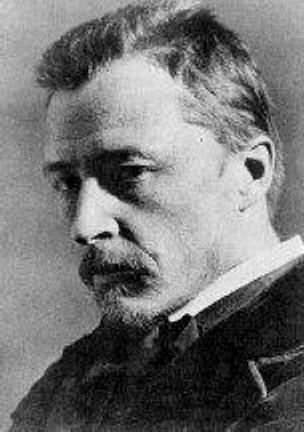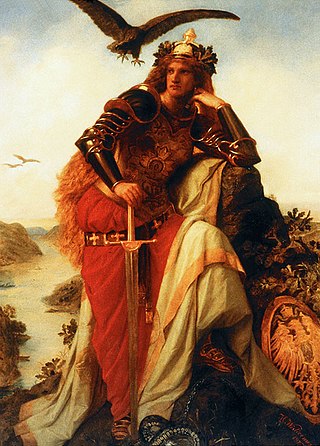Related Research Articles

Siegfried, WWV 86C, is the third of the four music dramas that constitute Der Ring des Nibelungen, by Richard Wagner. It premiered at the Bayreuth Festspielhaus on 16 August 1876, as part of the first complete performance of The Ring cycle.

"My Country, 'Tis of Thee", also known as simply "America", is an American patriotic song, the lyrics of which were written by Samuel Francis Smith. The song served as one of the de facto national anthems of the United States before the adoption of "The Star-Spangled Banner" as the official U.S. national anthem in 1931. The melody used is the same as that of the national anthem of the United Kingdom, "God Save the King".

Hugo Philipp Jacob Wolf was an Austrian composer of Slovene origin, particularly noted for his art songs, or Lieder. He brought to this form a concentrated expressive intensity which was unique in late Romantic music, somewhat related to that of the Second Viennese School in concision but diverging greatly in technique.

"Oben am jungen Rhein" is the national anthem of Liechtenstein. Written in the 1850s, it is set to the melody of the British anthem, "God Save the King", which in the 19th century had been used for a number of anthems of German-speaking nations, including those of Prussia, Bavaria, Saxony, and Switzerland.

"Die Wacht am Rhein" is a German patriotic anthem. The song's origins are rooted in the historical French–German enmity, and it was particularly popular in Germany during the Franco-Prussian War and the First World War. The original poem was written by Max Schneckenburger during the Rhine crisis of 1840, and is generally sung to music written by Karl Wilhelm in 1854, seven years after Schneckenburger's death.

"Gott erhalte Franz den Kaiser" was a personal anthem to Francis II, Emperor of the Holy Roman Empire and later of the Austrian Empire, with lyrics by Lorenz Leopold Haschka (1749–1827) and music by Joseph Haydn. It is sometimes called the "Kaiserhymne". Haydn's tune has since been widely employed in other contexts: in works of classical music, in Christian hymns, in alma maters, and as the tune of the "Deutschlandlied", the national anthem of Germany.

Kindertotenlieder is a song cycle (1904) for voice and orchestra by Gustav Mahler. The words of the songs are poems by Friedrich Rückert.

"Heil dir im Siegerkranz" was the Kaiserhymne of the German Empire from 1871 to 1918 and royal anthem of Prussia from 1795 to 1918.
Tannhäuser is an 1845 opera in three acts, with music and text by Richard Wagner. It is based on two German legends: Tannhäuser, the mythologized medieval German Minnesänger and poet, and the tale of the Wartburg Song Contest. The story centres on the struggle between sacred and profane love, as well as redemption through love, a theme running through most of Wagner's work.

Robert Reinick was a German painter and poet, associated with the Düsseldorf school of painting. One of his poems, Dem Vaterland, was set to music by Hugo Wolf and another, The Flight into Egypt was the libretto for a cantata by Max Bruch. He wrote the libretto to Schumann's opera Genoveva.

"Rufst du, mein Vaterland?" is the former national anthem of Switzerland. It had the status of de facto national anthem from the formation of Switzerland as a federal state in the 1840s, until 1961, when it was replaced by the Swiss Psalm.

"Ich hab mich ergeben", originally titled "Gelübde" ("Vow"), is a German patriotic song. The text was written in 1820 by Hans Ferdinand Maßmann. It was one of the unofficial national anthems of West Germany from 1949 to 1952, when the "Deutschlandlied" was officially reinstated. Its tune is now used in the Micronesian national anthem.
Chant du Rossignol, as it was published in 1921, is a poème symphonique by Igor Stravinsky adapted in 1917 from his 1914 opera The Nightingale.

Andrzej Roman Kurylewicz, was a Polish composer, pianist, trombonist, trumpet player and conductor. His works range from serious music, including both chamber and orchestral music, to theatrical, film, ballet, and jazz. He was shaped in the tradition of classical music and pioneered Polish jazz, pursuing a parallel career. He gained nationwide popularity by writing music for Janusz Morgenstern's 1976 TV series Polskie drogi.
Sholto Kynoch is an English pianist.

The Triumphlied (Op. 55) is a work for baritone solo, choir and orchestra by the German composer Johannes Brahms. Brahms wrote the work on the occasion of the German victory in the Franco-Prussian War and dedicated it to emperor Wilhelm I. The text itself emanates from the Book of Revelation predicting the downfall of Babylon but is consciously reinterpreted into political terms. It premiered on 5 June 1872 in Karlsruhe. Due to its patriotic message bound to the zeitgeist of the Unification of Germany, the Triumphlied lost popularity after World War I, despite its musical quality. Today it is one of Brahms's rather unknown œuvres.
Michele Trenti is an Italian composer and conductor.
Franz Schubert's best-known music for the theatre is his incidental music for Rosamunde. Less successful were his many opera and Singspiel projects. On the other hand, some of his most popular Lieder, like "Gretchen am Spinnrade," were based on texts written for the theatre.
Italienisches Liederbuch is a collection of 46 Lieder by Hugo Wolf (1860–1903). The first 22 songs were composed between September 1890 and December 1891, and published in 1892. The other 24 songs were composed between March and August 1896, and published the same year. The time lag between the two volumes was caused by Wolf's long-proposed opera, Der Corregidor (1895), which might have been inspired by his personal love triangle with his friend’s wife Melanie Köchert. The 46 lyrics of the songs were taken from an anthology of Italian poems by Paul Heyse (1830–1914), translated into German and published with the title of Italienisches Liederbuch in 1860. Despite Heyse’s diverse poetic selections, Wolf preferred the rispetto, a short Italian verse usually consisting of eight lines of ten or eleven syllables each, as a result of which the songs are short.
References
- ↑ Urban, Louise McClelland (ed.). Hugo Wolf. Letters to Melanie Köchert. The University of Wisconsin Press. Page 7.
- ↑ CD Booklet. Hugo Wolf. The Complete Songs.